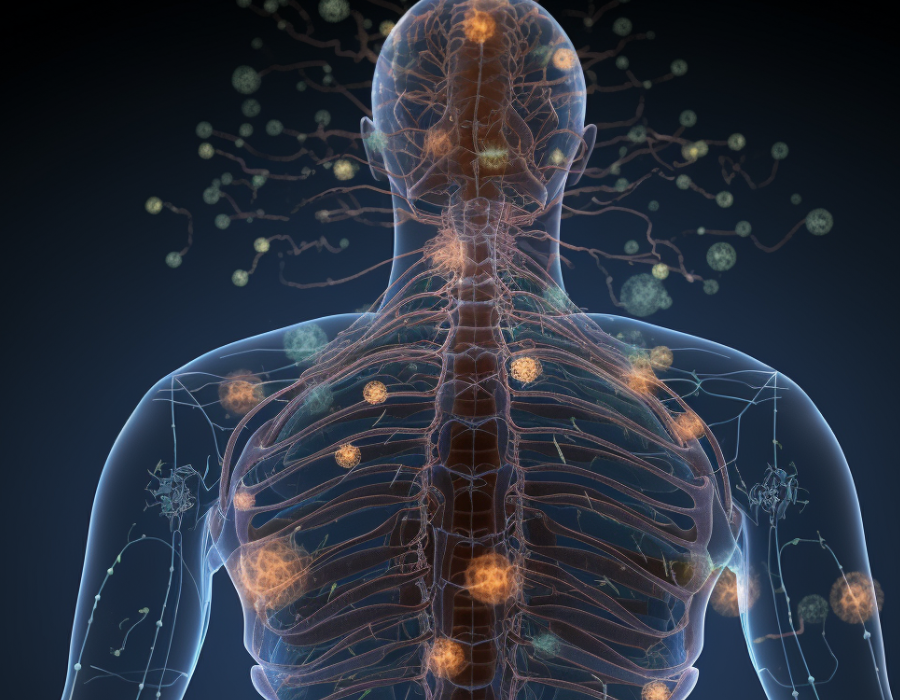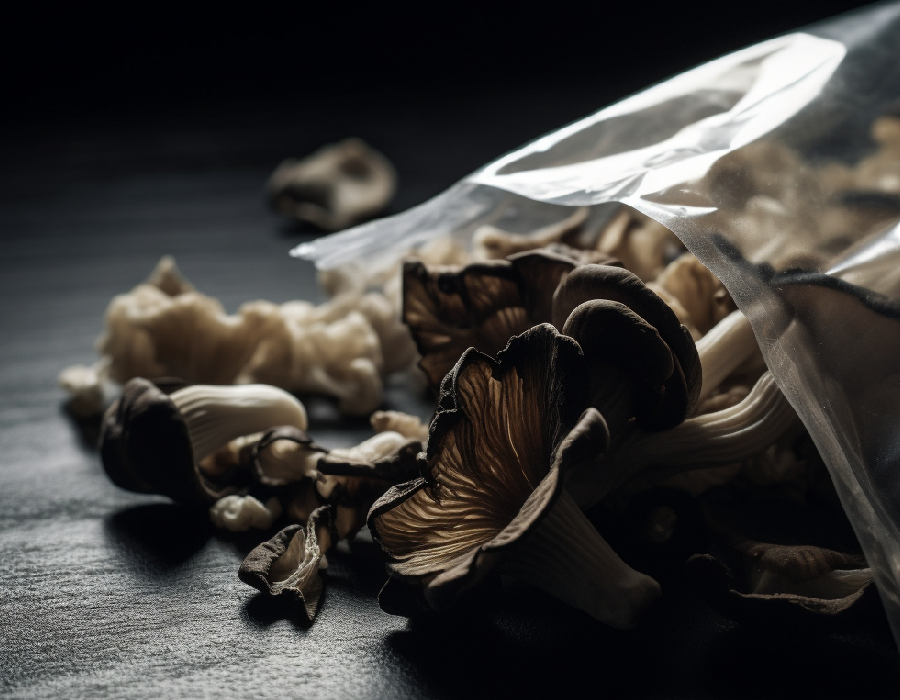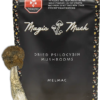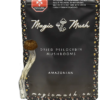Understanding the Complex Interaction Between Psilocybin and Antidepressants: For years, I struggled with depression.
Like many others, I found myself caught in a cycle of ups and downs, trying one medication after another, hoping to find something that would finally work.
I was prescribed SSRIs—selective serotonin reuptake inhibitors—by my doctor, and while they helped stabilize my mood, they also left me feeling somewhat disconnected.
My emotions remain locked away; I see them, but I can’t quite reach them.
That’s when I first came across psilocybin, the active compound in magic mushrooms, and started reading about its potential for overcoming depression. The idea was both fascinating and intimidating.
Could psilocybin really help me feel more connected, more in tune with my emotions? But the question that kept nagging at me was:
Could it be safe to try psilocybin while still on antidepressants? Would it even work, or would the two interfere with each other?
As I began to dig deeper into the topic, I realized that I wasn’t alone in this concern. Many people on SSRIs or other mood-stabilizing medications share the same curiosity.
The idea of combining psilocybin with antidepressants raises a lot of questions: Could there be harmful interactions? Would it negate the benefits of either treatment?
Or, is it possible that psilocybin could still have a positive impact, even if you’re already on medications? What about the risk of serotonin syndrome—an incredibly rare but potentially dangerous condition that arises when serotonin levels become too high?
The more I researched, the more I found conflicting information, and the more questions I had. It became clear that while psilocybin was showing promise as a treatment for depression, the science on its interaction with antidepressants wasn’t as clear-cut as I had hoped.
This article aims to explore those very questions and offer a clearer picture of what happens when people use psilocybin alongside antidepressants.
Whether you’re someone on SSRIs, SNRIs, or other antidepressant medications, or if you’re just curious about how psilocybin could fit into your mental health journey, this guide is for you.
We’ll look at how psilocybin works in the brain, how antidepressants affect mood and serotonin, and what are the risk of combining both.
Most importantly, we’ll discuss the safety concerns and offer practical advice to help you make an informed decision.

How Psilocybin and Antidepressants Interact
The interaction between psilocybin and antidepressants is a topic of increasing interest, as more people consider using psychedelics to treat mental health conditions such as depression, anxiety, and PTSD.
However, for those already taking antidepressants like SSRIs (Selective Serotonin Reuptake Inhibitors) or SNRIs (Serotonin-Norepinephrine Reuptake Inhibitors), the question of whether it’s safe or effective to combine psilocybin with these medications is a valid concern.
To better understand this interaction, we need to take a closer look at how each substance works in the brain and the potential risks and benefits of combining them.
How Psilocybin Works in the Brain
Psilocybin, the active compound found in magic mushrooms contains psychoactive properties.
After ingestion , psilocybin converts to psilocin, which primarily affects serotonin receptors in the brain.
Specifically, psilocin binds to the 5-HT2A receptor, which plays a significant role in regulating mood, cognition, and perception.
This interaction results in changes to sensory perception, emotional processing, and thought patterns.
Many users report experiencing heightened emotional awareness, a sense of ego dissolution (where the boundary between self and the world seems to fade), and shifts in their overall view of reality.
These effects can lead to a deeper understanding of oneself and one’s emotions, often providing profound therapeutic benefits for those dealing with depression or other mental health challenges.
However, the intensity and depth of a psilocybin experience can vary depending on the individual’s mental state, the dosage, and, notably, their medication.
When someone is already taking an antidepressant, the way psilocybin interacts with the brain’s serotonin system can be influenced by the medication’s effects.
How Antidepressants Work
Doctors commonly prescribe antidepressants like SSRIs and SNRIs for conditions such as depression, anxiety, and obsessive-compulsive disorder.
These medications work by altering the balance of neurotransmitters in the brain, particularly serotonin. SSRIs, for instance, block the reabsorption (or reuptake) of serotonin, increasing its levels in the brain over time. This boost in serotonin helps improve mood, reduce anxiety, and regulate emotional responses.
Similarly, SNRIs also block the reuptake of serotonin, but they additionally target norepinephrine, another neurotransmitter involved in mood regulation.
While SSRIs and SNRIs can be effective for treating depression and anxiety, they also have a notable side effect: they can desensitize the serotonin receptors over time.
This means that the receptors become less responsive to serotonin, including psilocybin’s effects.
As a result, some users report that the intensity of their psilocybin experience significantly diminishes when combined with these medications.
Other classes of antidepressants, such as MAOIs (Monoamine Oxidase Inhibitors) and atypical antidepressants, affect the brain’s neurotransmitter systems in different ways.
MAOIs, for example, prevent the breakdown of serotonin, dopamine, and norepinephrine, while atypical antidepressants work through a variety of mechanisms.
The interaction between psilocybin and these medications is even less well-understood, and combining them can carry additional risks, as we’ll explore below.

Potential Issues When Combining Psilocybin with Antidepressants
While the use of psilocybin in conjunction with antidepressants is an area of active interest and research, there are several potential issues that individuals should be aware of before combining the two.
These issues are rooted in how both psilocybin and antidepressants interact with the brain’s complex serotonin system, which is responsible for regulating mood, emotion, and cognition.
The potential risks and side effects vary depending on the type of antidepressant, the individual’s brain chemistry, and the dosage of both the antidepressant and psilocybin.
Below, we delve deeper into the most common and significant issues that may arise when psilocybin is combined with antidepressants like SSRIs, SNRIs, and other types of mood-stabilizing medications.
Blunted Psychedelic Effects
One of the most frequently reported issues when combining psilocybin with antidepressants is a phenomenon called “blunted effects.” The active compound in magic mushrooms, psilocybin, works by interacting with serotonin receptors in the brain, particularly the 5-HT2A receptor.
This interaction leads to profound changes in perception, mood, and consciousness, often described as an altered state of awareness that can bring about personal insights, emotional breakthroughs, and even deep feelings of connection to the world around you.
However, antidepressants like SSRIs (Selective Serotonin Reuptake Inhibitors) and SNRIs (Serotonin-Norepinephrine Reuptake Inhibitors) work by increasing serotonin levels in the brain. Over time, the use of these medications can lead to a desensitization of serotonin receptors, particularly the 5-HT2A receptor, which is key to the effects of psilocybin.
Essentially, the more you use SSRIs or SNRIs, the less responsive these receptors become to external serotonin-like substances, including psilocybin.
As a result, individuals who are on antidepressants often report that their psilocybin trips are less intense, with reduced emotional depth and altered perceptions.
For some, this means a less transformative experience, as the emotional breakthroughs and the heightened sense of self-awareness that can come with a psychedelic journey might be dulled or entirely absent.
This blunted effect can be disappointing for those who turn to psilocybin for its potential to address mental health issues like depression or anxiety, as the full therapeutic benefits may not be realized when the medication is interfering with the brain’s ability to process psilocybin effectively.
Increased Risk of Serotonin Syndrome
Serotonin syndrome is one of the most serious risks of combining psilocybin with antidepressants, though it remains a relatively rare occurrence.
This potentially life-threatening condition results from an overload of serotonin in the brain, which can occur when multiple substances that increase serotonin are taken together.
Both psilocybin and antidepressants like SSRIs, SNRIs, and MAOIs (Monoamine Oxidase Inhibitors) affect serotonin levels. When taken in combination, the brain may be flooded with too much serotonin, overwhelming the serotonin receptors and causing a cascade of symptoms.
Serotonin syndrome is typically characterized by a combination of symptoms, including agitation, confusion, rapid heart rate, high blood pressure, dilated pupils, sweating, muscle rigidity, and fever. In severe cases, it can lead to seizures, unconsciousness, and even death.
While serotonin syndrome remains rare in cases of psilocybin use, especially when taken in moderate doses, it is more likely when combined with certain antidepressants, particularly MAOIs.
These medications work by preventing the breakdown of serotonin, which can increase the risk of serotonin toxicity when used with psilocybin.
If you are considering combining psilocybin with antidepressants, it’s crucial to be aware of the symptoms of serotonin syndrome and to seek immediate medical attention if they arise. It’s always recommended to consult with a healthcare provider before using psilocybin while on any medication that affects serotonin levels.

Unpredictable Mood Effects
Another challenge when combining psilocybin with antidepressants is the potential for unpredictable mood effects.
While psilocybin can offer profound emotional and psychological healing for many people, the experience is not always straightforward or easy to predict.
When used alone, psilocybin can trigger deep emotional insights, releasing suppressed feelings or unresolved emotional trauma. These insights often lead to emotional breakthroughs that can significantly improve mental health, especially for those suffering from depression, anxiety, or PTSD.
However, antidepressants—particularly SSRIs and SNRIs—work by stabilizing mood over time. They often blunt emotional extremes to prevent mood swings, anxiety, and feelings of deep sadness.
As a result, combining psilocybin with antidepressants can lead to an emotionally muted or inconsistent experience. Some people report that while the antidepressants reduce the intensity of the psilocybin trip, they also dampen the emotional breakthroughs that psilocybin can facilitate.
The powerful catharsis and healing that many users experience during their psilocybin journeys may be muted or even absent altogether, preventing the individual from fully accessing the potential therapeutic benefits of the substance.
Furthermore, some individuals on antidepressants might experience intense mood swings, anxiety, or even agitation during the psilocybin experience, as the interaction between the two substances may lead to emotional instability.
These unpredictable mood effects can vary depending on the type of antidepressant, the dosage of both the antidepressant and psilocybin, and the individual’s overall mental health state.
Increased Withdrawal and Discomfort from Tapering Off Antidepressants
For some individuals, a common approach to using psilocybin while on antidepressants is to gradually taper off the medication to allow for a more impactful psychedelic experience.
The idea is to reduce the interference that antidepressants may have on the psilocybin’s effectiveness, allowing the user to experience the full range of therapeutic effects. However, tapering off antidepressants is not without its risks and challenges.
Abruptly stopping SSRIs, SNRIs, or any other antidepressants can lead to withdrawal symptoms, which may include dizziness, nausea, headache, fatigue, irritability, mood swings, and even flu-like symptoms.
This can be extremely uncomfortable and potentially dangerous, especially if done without proper medical supervision.
We strongly recommend using these medications with the guidance of a healthcare provider is . They can help you minimize the withdrawal effects and make the transition to psilocybin use safer.
In addition to physical withdrawal symptoms, there may be emotional or psychological consequences from stopping antidepressants.
Some individuals might experience a resurgence of depression or anxiety, introducing psilocybin can exacerbate the situation.
For others, the emotional vulnerability triggered by the psilocybin experience may be too intense if they are still in a fragile mental state after tapering off their medication.

Tapering Off Antidepressants Before a Psilocybin Experience
Some people who want to combine psilocybin with antidepressants choose to taper off their medications gradually to maximize the effects of psilocybin.
This approach is based on the idea that reducing the dose of SSRIs or SNRIs might help restore serotonin receptor sensitivity, allowing the psilocybin to have a stronger impact.
However, abruptly stopping antidepressants can have serious consequences. SSRIs and SNRIs can cause withdrawal symptoms when discontinued too quickly.
These can include mood swings, anxiety, dizziness, and even flu-like symptoms. Any decision to reduce or stop taking antidepressants requires the guidance of a healthcare provider to avoid these risks.
Key Takeaways
It’s clear that combining psilocybin with antidepressants, especially SSRIs and SNRIs, presents several potential challenges.
While SSRIs can dull the effects of psilocybin and limit its emotional impact, they also pose a risk of serotonin syndrome, though such cases are rare.
If you’re considering using psilocybin while on antidepressants, it’s crucial to consult a healthcare professional. They can help you understand the potential risks and help you make an informed decision about whether it’s safe for you.

Your Psilocybin Journey Starts Here—Discover What Magic Mush Can Offer
The interaction between psilocybin and antidepressants is complex and not entirely understood, but what we do know is this: combining SSRIs or other antidepressants with psilocybin may reduce the psychedelic experience’s intensity.
SSRIs, which elevate serotonin levels in the brain, can dull the effects of psilocybin by desensitizing serotonin receptors.
While this doesn’t completely rule out the potential benefits of psilocybin for someone on antidepressants, it does mean that you might not experience the same profound emotional breakthroughs.
Furthermore, there is a potential, albeit rare, risk of serotonin syndrome, a dangerous condition caused by excessive serotonin buildup.
For those considering incorporating psilocybin into their treatment while on antidepressants, it’s crucial to consult a healthcare provider first.
While some people choose to taper off their medications before a psilocybin experience to maximize the psychedelic effects, do this under medical supervision to avoid withdrawal symptoms and other risks.
Ultimately, a careful and informed approach is key to ensuring both safety and a positive experience with psilocybin.
At Magic Mush California, we commit to guiding you through every step of your psilocybin journey.
Whether you’re curious about how psilocybin could complement your antidepressant treatment or are simply looking for a safe, reliable source of magic mushrooms, Magic Mush is your destination.
As experts in the field, we emphasize education, safety, and responsible use to ensure you can experience the full potential of psychedelics.
Our premium-quality products meet the highest standards, so you can trust that you’re getting the best available on the market.
Explore the world of psilocybin with Magic Mush, where we aim to destigmatize magic mushrooms and provide a supportive, informative community for all.
We believe in the power of psychedelic therapy and the transformative experiences it can offer, and we’re here to help you safely navigate this journey.
Check out our shop, and don’t hesitate to reach out to our knowledgeable team for any questions you may have. Ready to take the next step? With Magic Mush, the possibilities are endless.




